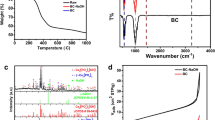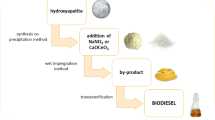Abstract
Biodiesel produced from animal and plant fat oils is sustainable, but there is a need for efficient heterogeneous catalysts for transesterification of crude oils into biodiesel. Here, spongy carbonate-fluorapatite loaded with nickel and iron was synthesized and tested for conversion of waste cooking oil into biodiesel. The catalyst was synthesized by dissolution of phosphorite in nitric acid, and then nickel chloride was dissolved in the filtrate. The catalyst was then precipitated with ammonia and heated at 150 °C for 12 h, thus yielding a spongy porous solid containing about 8% iron and 3% nickel. Results show a 97.5% biodiesel yield at 70 °C in 2 h using 10 wt% catalyst dose and 8:1 methanol/oil ratio. The final biodiesel product matches the specification of ASTM D-6571 and most of EN 14214 biodiesel standards. This novel catalyst achieves better results than normally used hydroxyapatite and other calcium-based catalysts.



Similar content being viewed by others
References
Akalın MK, Tekin K, Karagöz S (2017) Supercritical fluid extraction of biofuels from biomass. Environ Chem Lett 15(1):29–41. https://doi.org/10.1007/s10311-016-0593-z
Aresta M, Dibenedetto A, Carone M, Colonna T, Fragale C (2005) Production of biodiesel from macroalgae by supercritical CO2 extraction and thermochemical liquefaction. Environ Chem Lett 3(3):136–139. https://doi.org/10.1007/s10311-005-0020-3
Batista LN, Da Silva VF, Pissurno ECG, Soares TC, de Jesus MR, Kunigami CN, Brasil MG, da Fonseca MG (2015) Formation of toxic hexanal, 2-heptenal and 2,4-decadienal during biodiesel storage and oxidation. Environ Chem Lett 13(3):353–358. https://doi.org/10.1007/s10311-015-0511-9
Chen G, Shan R, Shi J, Liu C, Yan B (2015) Biodiesel production from palm oil using active and stable K doped hydroxyapatite catalysts. Energy Convers Manag 98:463–469. https://doi.org/10.1016/j.enconman.2015.04.012
Fan K, Liu J, Yang X, Rong L (2014) Hydrocracking of Jatropha oil over Ni–H3PW12O40/nano-hydroxyapatite catalyst. Int J Hydrogen Energy 39:3690–3697. https://doi.org/10.1016/j.ijhydene.2013.12.123
Gude VG, Martinez-Guerra E (2017) Green chemistry with process intensification for sustainable biodiesel production. Environ Chem Lett. https://doi.org/10.1007/s10311-017-0680-9
Hashimoto Y, Sato T (2007) Removal of aqueous lead by poorly-crystalline hydroxyapatites. Chemosphere 69:1775–1782. https://doi.org/10.1016/j.chemosphere.2007.05.055
Lehnen DR, Guzatto R, Defferrari D, Albornoz LL, Samios D (2014) Solvent-free biodiesel epoxidation. Environ Chem Lett 12(2):335–340. https://doi.org/10.1007/s10311-013-0448-9
Liao D, Zheng W, Li X, Yang Q, Yue X, Guo L, Zeng G (2010) Removal of lead(II) from aqueous solutions using carbonate hydroxyapatite extracted from eggshell waste. J Hazard Mater 177:126–130. https://doi.org/10.1016/j.jhazmat.2009.12.005
Liu Q, Wang B, Wang C, Tian Z, Qu W, Ma H, Xu R (2014) Basicities and transesterification activities of Zn–Al hydrotalcites-derived solid bases. Green Chem 16:2604–2613. https://doi.org/10.1039/c3gc42648c
Ma Y, Wang Q, Sun X, Wu C, Gao Z (2017) Kinetics studies of biodiesel production from waste cooking oil using FeCl3-modified resin as heterogeneous catalyst. Renew Energy 107:522–530. https://doi.org/10.1016/j.renene.2017.02.007
Nisar J, Razaq R, Farooq M, Iqbal M, Khan RA, Sayed M, Shah A, Ur Rahman I (2017) Enhanced biodiesel production from Jatropha oil using calcined waste animal bones as a catalyst. Renew Energy 101:111–119. https://doi.org/10.1016/j.renene.2016.08.048
Oliveira L, Da Silva M (2013) Relationship between cetane number and calorific value of biodiesel from Tilapia visceral oil blends with mineral diesel. Renew Energy Power Qual J. https://doi.org/10.24084/repqj11.415
Rhaiti H, Laghzizil A, Saoiabi A, El Asri S, Lahlil K, Gacoin T (2012) Surface properties of porous hydroxyapatite derived from natural phosphate. Mater Chem Phys 136:1022–1026. https://doi.org/10.1016/j.matchemphys.2012.08.042
Samart C, Chaiya C, Reubroycharoen P (2010) Biodiesel production by methanolysis of soybean oil using calcium supported on mesoporous silica catalyst. Energy Convers Manag 51:1428–1431. https://doi.org/10.1016/j.enconman.2010.01.017
Sandrine B, Ange N, Didier BA, Eric C, Patrick S (2007) Removal of aqueous lead ions by hydroxyapatites: equilibria and kinetic processes. J Hazard Mater A 139:443–446. https://doi.org/10.1016/j.jhazmat.2006.02.039
Viriya-empikul N, Krasae P, Nualpaeng W, Yoosuk B, Faungnawakij K (2012) Biodiesel production over Ca-based solid catalysts derived from industrial wastes. Fuel 92:239–244. https://doi.org/10.1016/j.fuel.2011.07.013
Yi Y-B, Lee J-W, Chung C-H (2015) Conversion of plant materials into hydroxymethylfurfural using ionic liquids. Environ Chem Lett 13(2):173–190. https://doi.org/10.1007/s10311-015-0503-9
Zabeti M, Daud WMAW, Aroua MK (2009) Activity of solid catalysts for biodiesel production: a review. Fuel Process Technol 90:770–777. https://doi.org/10.1016/j.fuproc.2009.03.010
Acknowledegements
The authors of this paper thank the Assiut University, Egypt, for funding the study as a research project of the M.Sc. thesis of the second author (Fatma Dardir).
Author information
Authors and Affiliations
Corresponding author
Rights and permissions
About this article
Cite this article
Abukhadra, M.R., Dardir, F.M., Shaban, M. et al. Spongy Ni/Fe carbonate-fluorapatite catalyst for efficient conversion of cooking oil waste into biodiesel. Environ Chem Lett 16, 665–670 (2018). https://doi.org/10.1007/s10311-017-0695-2
Received:
Accepted:
Published:
Issue Date:
DOI: https://doi.org/10.1007/s10311-017-0695-2




